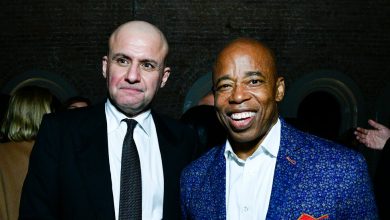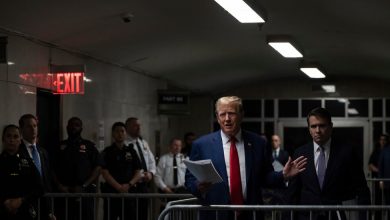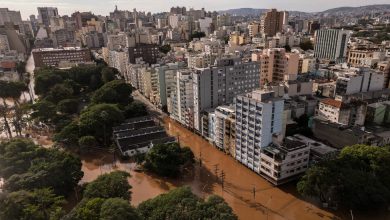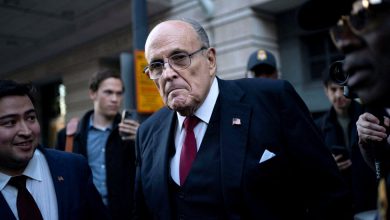In Mexico, Adams Praised Migrants. He Also Told Them to Stop Coming.

Mayor Eric Adams of New York City touched down in Mexico this week on an urgent four-day mission: to witness firsthand the forces that have brought more than 120,000 migrants to New York, and to warn migrants in transit of the misery that awaits them once they arrive.
He planned to visit the passageways migrants take through Ecuador and Colombia — including a treacherous stretch of jungle in Panama known as the Darién Gap. But first, Mr. Adams spent 24 hours in Mexico cheerleading for his city and singing the praises of immigrants.
On Thursday, he hyped the “Empire State of Mind” at a forum on Mexican-American business relations in Mexico City. Stumping for the city’s burgeoning technology sector, he extended an invitation: “Any tech companies out here, wherever you are, pack your bags, move to New York City and bring it here.”
Then he headed to the city of Puebla to pay homage to the hometown of much of New York City’s Mexican immigrant community. In a speech in Puebla’s state Congress building, Mr. Adams described how New York City’s immigration affairs commissioner, who joined him on the trip, had come from Puebla as a child, “in search of the American dream.”
“I am here in Mexico to say that we have been long partners. We are neighbors. We are familiars,” he said. “Mi casa es su casa.”
The split purpose of his trip — to sell New York as a great place to do business but a terrible place for the newest migrants to try to work or live — reflects the challenges Mr. Adams faces back home.
Less than two years into his tenure, the distraction and cost of finding new places to house and feed the 60,000 migrants currently in the city’s care have thrown his agenda off track and exacerbated some of the city’s most pressing problems, including a spiraling housing crisis.
The migrant crisis has also drawn pushback from his constituents and at times pitted him against other Democrats who might otherwise be allies, including President Biden and Gov. Kathy Hochul.
The Adams administration has responded to the problem in a variety of ways. This week, city lawyers continued their effort to change the court decree that requires the city to house all homeless people — including migrants. They asked a judge to let the mayor waive the so-called right to shelter for some groups during “emergencies.”
Mr. Adams has also gone on the road, to Washington, D.C., and to the border, to make his case that the federal government should do more to help and that migrants should stop coming.
Earlier in the week, the mayor said that on this trip, he planned to blanket the media in Latin America with the message that New York City was absolutely out of room and that migrants should not expect “to stay in a five-star hotel.”
In a room in Puebla’s Congress building featuring an ornate memorial to migrants who had died crossing the border, decorated with statues of angels and weeping children, he told reporters that one of his goals was “to communicate to the people of all the countries we are visiting that New York City has reached capacity and we don’t want to turn their aspiration for dreams into a nightmare.”
Natalia Banulescu-Bogdan, an immigration expert who has conducted research on messaging around immigration, offered a blunt assessment of the mayor’s plan. “I don’t believe that this method will be effective,” said Ms. Banulescu-Bogdan, a deputy director of the Migration Policy Institute, a nonpartisan think tank.
She said the mayor’s claim that the city is out of room is contradicted by the social media posts and news accounts migrants see showing people finding places to stay and work in the city.
“The other problem,” Ms. Banulescu-Bogdan said, “is the messenger: People understand that government actors have their own incentive and interests behind the message they’re trying to disseminate.” They are much more likely to believe things they hear from people they know and trust, she said.
Mr. Adams’s negative publicity campaign, Ms. Banulescu-Bogdan said, could easily backfire. The surreal sight of the mayor of America’s financial capital — a stylish man with swagger — traveling thousands of miles to one of the most desperate places on earth could end up inadvertently functioning as a recruiting tool, she said.
Migrants might come away thinking that if the mayor is so worried about the drain on the city’s resources he was willing to go to the effort to tell them in person, the city must be a place with tremendous resources. On the other hand, she said, Mr. Adams could benefit at home from being seen as a hands-on leader “willing to roll up his sleeves.”
Before this trip, the mayor had often met with migrants to hear their stories. On his trip to the border in January, he told a group of migrants in El Paso that he would fight for them to be able to work and to “experience the American dream,” even as he tried to dissuade them from coming to New York.
In a speech in Mexico City on Thursday morning, he warned about the potential negative effects of migrants, suggesting that a large population of men might “impact shoplifting.”
Later in the day, he clarified that he was not trying to insinuate that there is evidence migrants are responsible for a shoplifting surge. The influx of migrants is creating “a desperate environment,” Mr. Adams said.
The mayor said he did not feel that he was delivering “mixed messages” on his trip.
Later in the day, in Puebla, the mayor received an honorary college degree, a framed plaque from the state Congress with the word “Recognition” on it in Spanish, and the governor’s Cinco de Mayo medal.
At a reception in the courtyard of the governor’s palace where the crowd included sons and daughters of Puebla who had migrated to New York and become successful, Mr. Adams compared the benefits of immigration to the pollination process. It sounded almost like an invitation to the newcomers.
“We can cross-pollinate with the migrants and asylum seekers across our region,” he said. “We only win if we pollinate with them, so they can produce the flowers that we were fortunate to produce.
“So together, let’s pollinate the crisis.”
Just after midnight, the mayor hopped on a flight for Quito, Ecuador’s capital. A tour of a refugee center awaited him in the morning.
Jeffery C. Mays contributed reporting.




